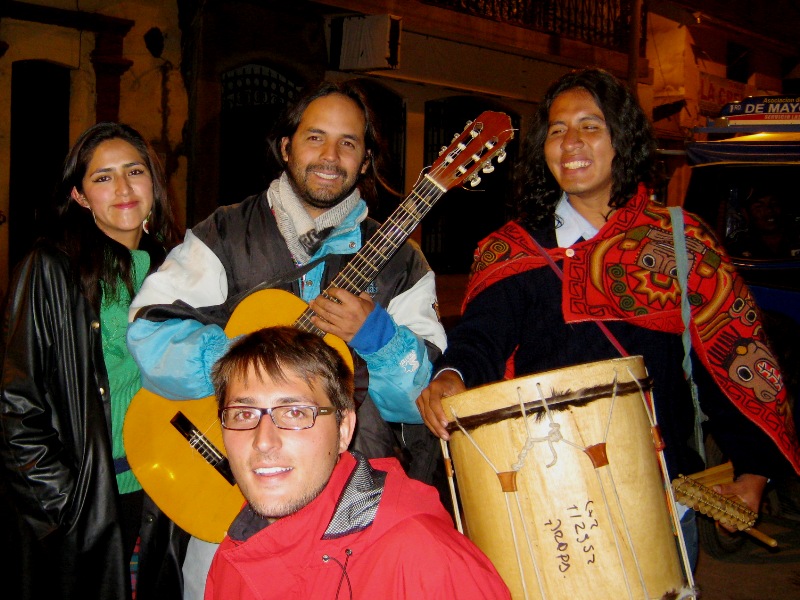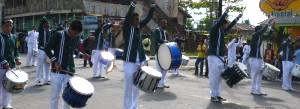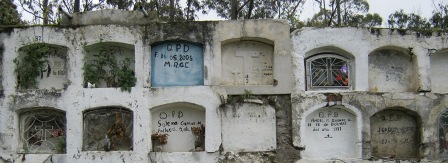
Welcome for an interview very different, as you have the occasion to discover to true modern troubadours, travelling in South America with a nice goal in mind: unit more this continent around the traditional Andean music, and of course discover.
Audio clip: Adobe Flash Player (version 9 or above) is required to play this audio clip. Download the latest version here. You also need to have JavaScript enabled in your browser.
Audio clip: Adobe Flash Player (version 9 or above) is required to play this audio clip. Download the latest version here. You also need to have JavaScript enabled in your browser.
Travelling, something probably ordinary for you, but remember that proportionality few of the south American know well their country, and fewer the neighbouring countries. The Peru, a small country in South America, is 3 times bigger than France, and some parts of the country are difficult to reach, or unreachable during the rainy season!
While we were eating in a popular restaurant in Puno, Peru, we were lucky enough to meet Juan Manuel and Sergio. Far away from the tourist restaurants, they play for the locals every day to keep travelling. And travelling like this was a know-full choice, Juan Manuel had an engineer job before he left.
They answered us spontaneously with a great passion to share their way of life.
Te interview is in Spanish (8 min), here is the transcription and translation in English.
Let’s step into troubadours shoes for a while!
First and second part :
Audio clip: Adobe Flash Player (version 9 or above) is required to play this audio clip. Download the latest version here. You also need to have JavaScript enabled in your browser.
Audio clip: Adobe Flash Player (version 9 or above) is required to play this audio clip. Download the latest version here. You also need to have JavaScript enabled in your browser.
Note : the translation is very free, to make it more readable.
Rémi: Where are you from?
Juan Manuel (guitar, voice) : I’m from Arequipa
Sergio (pan flute, drum): from Lima
R.: So, where do you play?
JM: We have a lot of experience of playing in Pérou, but we play in all South America: Bolivia, Argentina, Paraguay,Uruguay.
R.: And what type of music do you play?
JM: Generally, we are playing for the locals. This is the mentality of South America, therefore we play music from here, from Peru, Bolivia, from Ecuador (NfT: Andean music), traditional music, folkloric. Yes, you have to know that there is a division in South America, some countries are really occidental, like Argentina, Chile, and Brazil.
In fact our project is to go to Brazil playing this type of music.
R.: How do people respond to your music?
J.M: Well, in Peru or Bolivia, people are very generous, they never failed us. We are always playing like this, with our heart in it, and people help us and support us.
But in some countries like Brazil or Argentina, where the culture is different, it’s harder to live like this, and so we have to use different strategy to receive money.
S.: Yeah, but in any case people do appreciate our music.
JM.: Yes, we are drawing attention, but for instance in Brazil we always sell a CD, so people can support us in a different fashion, by buying our CD.
R.: In Brazil, you speak Portuguese?
JM.: (speaking Portuguese) Yes a bit.
S.: For us it’s easier are the 2 languages are very alike.
R.: You play with 2 musicians or more?
S.: No, we are more, 4 or 5.
R.: Are their many other musicians who do the same as you?
S.: Yes, enormously,many live from music but stay in their city, others travel more.
We, we travel for discovering, for music, because we want the South America more united. We have friends in all the countries, who play music from their country in other countries.
R.: And what is your main reason to live like this : traveling, music, discovering…
JM.: It’s more a way of life.It’s really different to stay in your house and work .
I think this make you learn a lot. Not about music,As as Sergio says, some musicians stay at home. But I think that we are looking for something more
S.: It’s spiritual!
JM.:Yes, I think this is something more spiritual, you know, because for instance I can play other type of music: reggae, blues, rock.. But, you know, it’s something that only by living it you can understand.
R.: Is it like a connection?
JM.: Exactly, with people, with yourself, with world and life.
R.: You learned a lot playing like this?
S. and JM.: Yes.
JM.:It develops a lot your artistic personality, because as you know sometimes it’s difficult, braving ordinary passer-by of the street, and ask them a coin for what we do, I think people do it heartily. We learn a lot: humility, generosity, personality. These are skills you don’t develop staying at home.
R.: And how is it with authority (police, town council)
S.: It depends on where you play! In restaurants, here in South America it’s really common to play, as well as in the street, but there are places were you can’t play. In Cuzco, or Arequipa, you can’t play on the central place, neither in the streets, the throw you out.
JM.:I think there is always a way , for exeample I saw people going to the city council hall to get a licence, but they have to pay a lot, it’s painful. This is actually simpler to not do it.
R.: As you are a lot in the street, don’t you have problems with thieves, or do they respect music?
JM.:Yes, thieves respect music! Imagine that one time, in Arequipa, I was playing with a violinist (NoT: a very expensive music instrument in South America). A thieve goes by, and give us a coin!
S.: They know that we are in the street too, even if we do sleep in apartment or hostel, we are leaving from the street.
JM.:Yes, some do steal, but encounter them is very bad luck.
S.: Yes, there are very few.
R.: And you play also in the buses?
JM.: In restaurants, in bus, in the streets..
S.: For weddings.
JM.: Sometimes we are walking in the street, then someone comes and say “Come, come, come”, thay ask a song, and if we know it “Play me another”, Or people bring you back to a wedding, it’s how it happens!
R.: Spontaneously ?
JM.: Exactly, with a lot of spontaneity.
R.: You music instrument have to be very important for you?
JM.: Yes, this guitar knows 5 countries! She has accompanied me a lot, and I would like that she keeps doing it until I’m done with the travels, and then I would let here in peace.
Be aware that I play for 5 years, but Sergio only since one year, you can imagin his evolution!
S.: Yes, I do have a real will to progress,because in any fields when you try your best you will progress.
R.: And how did you learn music?
S.: Me, listening.
JM.:Me, I have always been sensible to the music, but I wasn’t born with it, I worked it. But discovering music like this in the street gave me a lot more than what I would have imagined. I think this only lets apart the technical aspect: music theory …
R.: Yes, music is not only about playing, it’s about communicating…
JM.: Exactly, you try to communicate emotions to people, but you have to learn notes, rhythm..
We learn with team, listening, in an empiric way. That’s how we do it. Some people are natural, good for them! But we have to work, and we do it well because it matters for us.
R.: Thanks a lot !










Quel plaisir cette interview ! On sent la passion de ces musiciens à chaque réponse mais aussi une profonde liaison entre ces pays grâce à cette culture populaire commune.
C’est aussi un peu étrange d’entendre Rémi parler en Espagnol, c’est une question que je me posais sur votre capacité de communication : ça a l’air de bien fonctionner !
Bonne continuation !
Oui, quel grand plaisir que ce reportage !
Et je vous suis aussi reconnaissant pour tout le travail que vous consacrez à votre site, à son enrichissement, pour notre plus grand plaisir… Que d’heures vous avez du passer pour retranscrire et traduire, en Français et en Anglais, ce long entretien en Espagnol !
Rémi : mais pourquoi diable, dans cet interview en Espagnol, comprends-je à peu près ce que tu dis, mais rien de ce que répondent tes interlocuteurs ? Ils ont un accent étranger non ? 😉
hey amigos .. muchas gracias por la entrevista !!! … disculpen ha pasado el tiempo y me habia olvidado que un dia en la calle de puno nos encontramos y sucedio aquello… estoy en brasil ahora…. estoy llendo a brasilia …pero les agradesco de corazon … estoy con sergio … muchas gracias de verdad por tener ese gusto de conocerlos .. nos ayudan a crecer mas… un abrazo ………
hey thanks so much because the interview … iam in brazil … with sergio … we are going to the coast .. the plan is going up …. if somebody talks about that write me please my email is: jeandalon@hotmail.com;;…. i would be a pleasure to speak … good luck i would be visiting more your page…….
Oi Juan…como você está!Eu queria entrar em contato com você a mais tempo, mas estava com alguns problemas, então resolvi esperar um tempo antes de entrar em contado.Só quero que saiba que foi um prazer te conhecer.Queria escrever para você em espanhol ,mas eu não sei escrever bem.Te desejo toda sorte e felicidade.Espero que entenda o que eu escrevi.Abraços de Marimar.